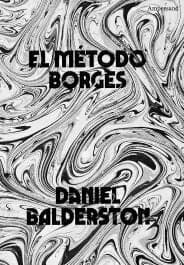Daniel Balderston, El método Borges
DOI:
https://doi.org/10.20420/Phil.Can.2022.473Keywords:
Borges, archive, working papers, method, aesthetics of the fragmentAbstract
Daniel Balderston, El método Borges. Trad. by Ernesto Montequin. Buenos Aires: Ampersand, 2021. 350 pages. ISBN: 978-987-4161-66-6.
Downloads
References
BALDERSTON, D. 2021. El método Borges. Trad. de E. Montequin. Buenos Aires: Ampersand.
BORGES, J. L. 1974. Obras completas. Buenos Aires: Emecé Editores.
BORGES, J. L. 2010. Deux fictions: “Tlön, Uqbar, Orbis Tertius” et “El sur”. Ed. de Michel Lafon. Genève/Paris: Fondation Martin Bodmer/Presses Universitaires de France.
ROSATO, L. y ÁLVAREZ, G. (ed.). 2010. Borges, libros y lecturas. Buenos Aires: Biblioteca Nacional.

Published
How to Cite
Issue
Section
License
Copyright (c) 2022 Daniel Fitzgerald

This work is licensed under a Creative Commons Attribution-NonCommercial-NoDerivatives 4.0 International License.
![]()
Philologica Canariensia is distributed under the terms of the Creative Commons Attribution–NonCommercial–NoDerivatives 4.0 Internacional.
Philologica Canariensia allows authors to retain unrestricted copyright and to retain it in the future.
The author is allowed to deposit the publisher's PDF version on his or her personal website, in an institutional or subject repository or in an social network. Authors who publish with this journal agree to the following terms:
a. Authors retain copyright and grant the journal right of first publication with the work simultaneously licensed under a Creative Commons Attribution License that allows others to share the work with an acknowledgement of the work's authorship and initial publication in this journal.
b. Authors are able to enter into separate, additional contractual arrangements for the non-exclusive distribution of the journal's published version of the work (e.g., post it to an institutional repository or publish it in a book), with an acknowledgement of its initial publication in this journal.
c. Authors are permitted and encouraged to post their work online (e.g., in institutional repositories or on their website), as it can lead to greater citation of published work (See The Effect of Open Access).



1.png)

1.png)



